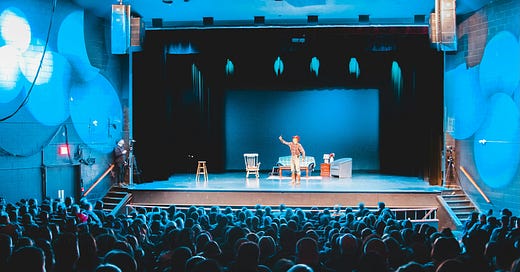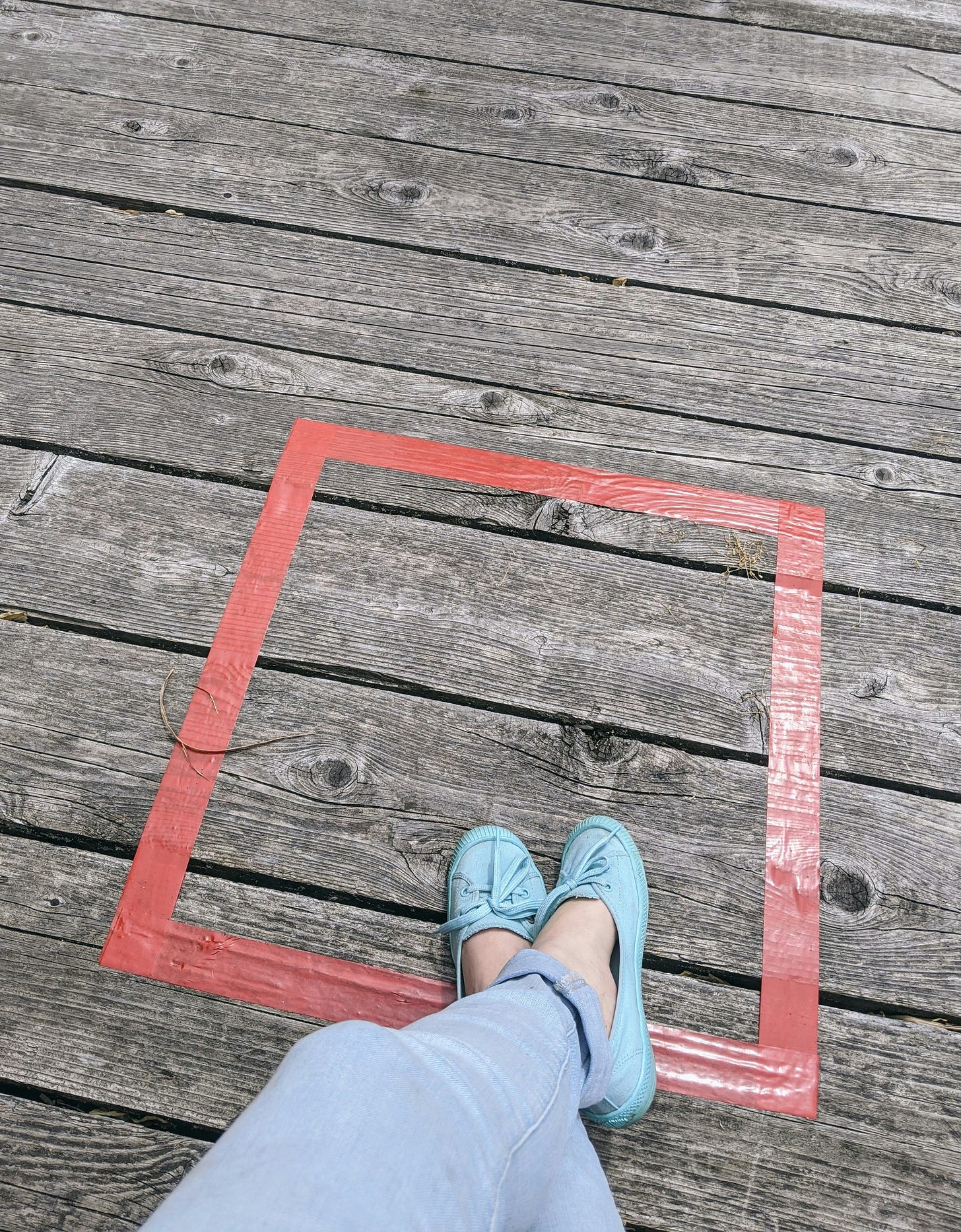Dancing, Singing, and Stepping Outside the Box
Join me as I trade formal galas for community theater, rediscovering my voice and learning how stepping outside your comfort zone can transform your teaching, performing, and your self.
Hi friends! Just Sarah here this week while Kaitlyn is in Boston and is busy preparing for her summer studies and workshops. She’ll be sharing more about her trips and everything she’s learning in the coming weeks. In the meantime, I want to share with you what I’ve been up to and the lessons I’m learning along the way.
As I mentioned in our podcast-style post, I recently auditioned for a musical, Cinderella, at a local community theater. While I teach musical theater every day, it’s been a long time since I’ve been in a musical and gone through the process myself. Most of my singing over the last few years has been for Bach festivals or formal music galas. The musical felt like an important learning opportunity, while my life was relatively stable, to step outside my comfort zone and experience everything my students go through. On a professional level, I wanted to do this to be a more empathetic and effective teacher for my singers. How can I coach them through the world of musical theater if I haven’t been there since high school myself?
I also did this for personal growth. I’ve always loved musical theater, but never felt like I had the “right voice” for it. When people heard me sing, I was told I would be a great classical singer and that was that. So I felt disconnected from the possibility of being any good at musical theater. I was also an incredibly anxious, terrified, and timid person when I was younger, so when I was involved in shows I didn’t fully embrace the experience. I was closed off, reluctant, and socially awkward.
So I’m bringing you along for the ride, sharing my story as this musical-loving, classical singer dives into a completely different world of singing. It’s been a fascinating study as I compare the worlds of classical music to musical theater. They have so much in common at their core, but operate on such different planes.
THE AUDITION PROCESS
Audition: Sunday at 7pm
I prepared two, 32-bar cut songs, a maximum of 3 minutes in length. I had to pick the right songs to both showcase my voice and the character(s) I wanted to portray. More terrifyingly, I had to prepare a dance for a dance call. Somehow, I have always avoided dancing in all of my operas and musicals, so this was absolutely frightening. I had to tap into my minimal dance training, A.K.A Zumba from when it was popular in my twenties.
During the audition, they were running about 30 minutes behind. This meant they combined dance calls with the group ahead of us. The only reason this is noteworthy is because somehow I managed to get myself in the position of doing the dance about 5-6 times, then IMMEDIATELY getting called to sing. As my fellow classical singers know, we are used to sitting, standing, singing, and sitting again. On occasion we may even stand and sing with the choir, THEN sing, then return to the choir. Gasp! The most exercise we typically get while performing is walking across the stage and dodging music stands, power cords, microphones, and string bows. NEVER have I had to dance and then immediately sing a ballad. So despite two months of consistent cardio at the gym, my voice was not prepared for this lethal combination of dance and song. I was winded and my voice was unstable for the first half of the 3-minute audition. I left the audition with my first growth goal; work on cardio and singing so I can be ready to go anytime.
Callbacks: Monday at 8pm
The email for callbacks went out almost immediately after auditions around 12:30am Monday morning. That meant sometime during my normal gym routine, meeting with my therapist, and a full day of teaching voice lessons, I had to learn the callback parts by 8pm that night. I was called back for 2 characters, the stepmother Madame, and a step-sister Charlotte. That’s when I was grateful for my classical training and ability to read music fast and well.
Your mid-thirties is an awkward place to be, age-wise, for community theater. I’m too old to play the young girls, but too young to play the mothers and older women. Or . . . just right to play both? I don’t know if I’m old or young now! I guess it depends on who you ask and my maturity level that day. Arguably they felt the same way because I was the only one called back for both Madame and Charlotte. I’ll take it as a compliment that I still look young enough to hang with the early twenty-somethings (don’t tell me the truth, I’m holding on to it).
Either way, the callbacks ended up being a blast. It was an hour full of singing the same 2 pages over and over again with different prompts. The overall goal seemed to be who could be the most absurd, take up space, and interact and react with those around you. There was a physical freedom that came with that expectation. You didn’t need to look polished or sound perfect. It was all about what can you do, and can you take direction. My takeaway was that it’s always easier to ask for someone to do less than it is to force someone to do more.
Casting: Thursday 9:15pm
Email invitations for roles were sent out late Thursday night that same week. To say it was a long week of waiting is an understatement. Despite trying to convince myself I’d be happy with any outcome, I was nervous for both me and my students (four of my adult students also auditioned, and they all got in) all week.
I was cast in the adult ensemble and as the Madame understudy. I didn’t know I would feel both relief and disappointment, but that’s exactly how I felt. Disappointed partly because it would be fun to have the actual role, and partly because I feel responsible to set an example for my students. If I don’t get a lead role, am I still relevant? Of course the answer is yes, but it’s a pressure I tend to put on myself. Relieved because it has been such a long time since I’ve done this.The last time I was in a musical I had so much social anxiety I cried in the bathroom after an acting exercise because I felt so self-conscious and anxious. While I’ve done a ton of work on myself over the years, there is still a part of me who is that 17-year old girl who wants to anxiously cry in a bathroom over this kind of thing. Overall, though, the woman who got the role is an acting genius and the most deserving, so I can’t even be upset about it. I’m just honored to be her understudy.
First Rehearsal: Sunday a week later
The first rehearsal was also a vastly different experience. We arrive at rehearsal, receive the script and score for the first time, then just run through the entire show without any preparation whatsoever. Next to dancing and singing in the same minute, this was a culture shock. I’m not used to stepping into a character, music, or story without an incredible amount of preparation or even a chance to read the script. I felt out of sync as I balanced reading both score and script, constantly getting lost, and consistently worrying they’d ask me to do something where I’d have to be “brilliant” on the spot. It was a great run, but I left feeling tired and wondering what I’d gotten myself into!
REFLECTION & ANALYSIS
As rehearsals have continued and I’ve gotten to know the people, I’ve begun to relax and embrace the process. I knew going into this it would be a learning experience and an opportunity for growth, and I’m fully committed to learning and growing.
Overall, the biggest difference I have noted so far between the classical and musical theater worlds is the pacing. In my classical singing, I receive an email inviting me to a gig, usually giving me months to prepare. I show up to rehearsals 1-2 weeks ahead of the performance, and then perform. The end. Even whenI’ve been hired to sing in choirs, they expect you to learn the music on your own and show up prepared. Musical theatre operates almost backwards, or at least it feels like it. There is an undercurrent of improvisation and playfulness that I haven’t experienced in my classical singing. Sure, I experienced this some in opera, but not to the extent that it exists within a musical.
There’s also a difference in physical demands. As mentioned, I rarely have to be active and sing at the same time. That doesn’t mean that I’m not physically engaged when I sing classically, but the movement, dancing, and occasional physical absurdity of acting changes my relationship with my body and my voice completely. I’m having to rediscover my voice from a new vantage point, which is both terrifying and utterly exhilarating.
The community theater is a 40-minute drive from my house, so I’ve had ample time to think about how all these skills can positively impact my singing in every genre. I think in the classical world it’s easy to take ourselves too seriously and try to do everything “right”. In the theatre world, it’s almost like they want you to do everything “wrong” just to see what happens. And for those like me who are afraid of showing their full selves–being physically free, and taking up space–what a perfect place and group of people to explore what your voice and body are fully capable of!
I find it such a shame that the classical singing and musical theatre worlds seem to be at odds with each other, or at the very least so separate. I’ve seen many schools where the theater/musical theater students and classical/vocal students rarely, if ever, cross paths, and it’s such a missed opportunity. We have so much we can learn from each other to fully grow in our singing and expressivity. As classical singers, we can learn to loosen up, play, act absurd, and connect to our bodies. Musical theater singers can learn from our musicianship, consistency, steadfastness, and focus. One style of singing is not superior to another, and the way I use my voice in one style has only enriched my singing in the other. There are so many colors and nuances for us to explore by dabbling into other areas of music and creativity.
Already, my takeaway from this venture is that I need to loosen up. Not everything needs to be so serious or perfect or formal. Maybe I should go jogging and then sing some Erbarme dich, mein Gott and pay attention to how my body feels. How does it relate to the song and its story? Maybe while singing Carmen arias I should completely change up my character and try to be as absurd as possible and see what it does for my technique and performance.
For those who have ventured in other waters, what have you learned from crossing into another genre and how has it impacted your singing? Where have you stepped outside of your comfort zone to grow as a singer, musician, and person? We’d love to hear about your journey and takeaways! Maybe it will help me find my next adventure.
Xoxo,
Sarah






